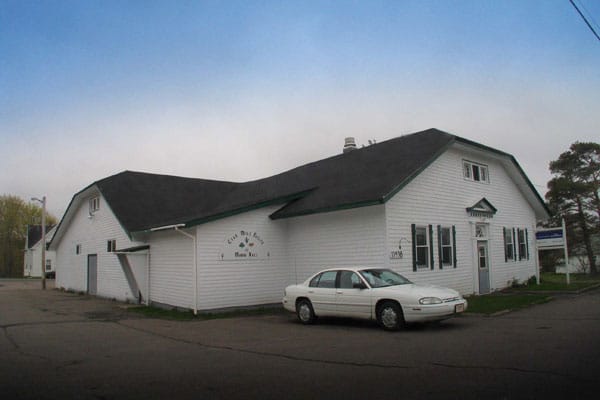Everyone passes through Mabou Hall - whether for bingo, elections or weddings-including a few Celtic musicians on the high road to stardom.
The first music that the Rankin kids ever heard probably entered their Mabou home from next door. With the sounds of fiddlers, piano players and step dancers echoing from the Mabou Hall and washing over their infant sleeps, the Rankins were well-poised to live out what was going on, melodically, in their dreams.
Mabou Hall is situated on one of the two primary streets in the western Cape Breton village of Mabou, one loosely referred to by default as Main Street, though it's actually Route 19, the other being Highland Street. It's as understated as the hall they tore down six years ago in Judique or the one in Port Hood or Glencoe Mills. Or the one in West Bay or Christmas Island or Iona. It is a plain, white shingled building with a kitchen, bathroom, a small stage and, most importantly for dancing, a wood floor. It's been owned by St. Mary's Parish for 30 or 40 years, depending on who you talk to.

It's said that the Mabou Hall began as an agricultural hall-it currently also has three federal agriculture government offices-and in fact at one time had a dirt floor, where livestock was exhibited. Its gradual expansions and refurbishments have kept it relevant and useful, maintaining its profile as the most important public place in the community. It's been used by everyone from the Catholic Women's League to minor hockey, for bake sales and card games and light lunches. But the core of that profile has been as a music and dance hall, where squares were called and musical talents were nurtured before the most appreciating of audiences-parents and siblings, cousins and in-laws, the parish priest and friends.
There's a sign on the hall that's adorned with thistles, a fleur-de-lis and shamrock, acknowledging the overlapping cultural influences of Cape Breton fiddle music, but it's the Scottish fiddling that's driven traditional music to its current height of popularity. The roll call of musicians who've passed through the hall's front door is the A list-the unquestionable who's who of the still-rising Celtic music phenomenon. "Junullen," otherwise known as John Allan Cameron, cut some of his teeth here, the abridging of his name a stereotypical matter of either expediency or laziness, lingering from earlier generations. Hence, Donulangus (Donald Angus), Dunarthur (Dan Arthur) or the likes of Jimmijoe (James Joseph). Of course the Mabou Hall often welcomed the prolific composer and fiddler Dan R. MacDonald, uncle to Junullen, as well as the names that all Canadians hold near and dear to their patriotic musical hearts: the sweetheart Natalie MacMaster; the wild boy Ashley MacIsaac; the master Buddy MacMaster; and The Rankins themselves. Cape Breton's Celtic music icons have come from various communities, yet playing at Mabou Hall seems to have been a rite of passage.
Music aside, about 11 years ago the hall was the site of one of the largest public events in the community's history. A handful of bureaucrats came to town to defend the planned closure of the federal post office. After an awful roasting by a horde of concerned locals-you couldn't put another person in the hall-and the passage of more than a decade, the post office is still operating, directly across the street.
Mabou Hall has hosted bingos and virtually every community dinner and concert imaginable since the Depression. It's been the place where ballots have been cast in countless federal and provincial elections. If you were from Mabou and got married, which eventually turns out to be almost everybody, your wedding reception was held in the hall.
Dances held there were officially dry until about the 1970s, when liquor began to be consumed in the hall rather than in your car in the parking lot, those days when "people drank more and drank faster" as one Mabou resident puts it. This heavy, rapid imbibing resulted in parking lot fights, another era that has for the most part passed. In those days, the boys from competing communities, Inverness or Port Hood for example, would arrive and cause a ruckus. Today, things are definitely more civilized. Perhaps it's a combination of civility and respect for the hallowed hall.
And respected it is. The Mabou Hall is not forgotten by the stars that, as fledglings, perhaps nervously got up on stage there. The Natalies and other stars come home to her and other community venues periodically for a good dose of grounding. When your stock in trade is honed and trademarked on that localized authenticity, it's best to keep in touch.
The tourism promoters of Nova Scotia call this part of Cape Breton Island the Ceilidh Trail, which is a real and wonderful thing. It's wonderful that shrines such as the Mabou Hall continue to turn the lights on Saturday nights, and wonderful for neighbours to hear its traditional music-perhaps influencing the generations to come.
